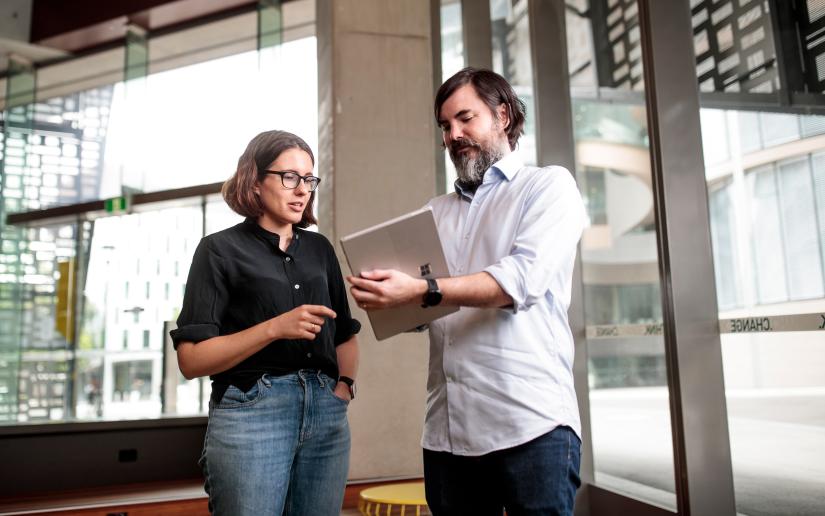
Dr Marika Kieferova and Professor Michael Bremner of the UTS Centre for Quantum Software and Information. Photo credit CQC2T
Collaborate with QSI
QSI's long established expertise in software and information processing capabilities of quantum computing and communication technologies places it in a unique position in Australia. QSI’s research strengths in software and theory complement not only our hardware and experimental activities, but also the research taking place in frontier quantum initiatives across the globe.
Here are some of the ways we partner with industry, academia and other world-leading quantum tech communities:
Designing quantum architectures
We work to formulate the next generation of quantum architecture design that promises to scale from hundreds to thousands to millions of physical qubits.
Working with multiple experimental groups to evolve their hardware systems beyond scalability bottlenecks, including Ion Trap designs targeted at the multi-million qubit level in collaboration with Universal Quantum and the University of Sussex, and superconducting qubit microarchitectures in collaboration with Tokyo University of Science and RIKEN. Multiple architecture designs over the past decade have been adopted by start-ups and national programs, most notably Moonshot Research & Development Japanese National Program. These blueprints form a basis of long-term strategic R&D into quantum computing for each.
Quantum benchmarking – Bench-Q
Performance analytics are a critical component of the classical information processing industry. Creating performance benchmarks for quantum algorithms is likewise critical. As part of DARPA’s Quantum Benchmarking Program we are developing the Bench-Q platform.
With automatic error-corrected compilation from high-level circuits written in major languages such as QISKIT, Cirq or Q#, the Bench-Q platform is designed to give detailed breakdowns on the number of qubits and the time needed to complete a given algorithm. Collaborating with major hardware providers such as IonQ, Rigetti, SQC and PsiQuantum, performance analytics can be tailored to each hardware platform such that rapid feedback on hardware resources can be provided to both quantum hardware and software developers.
The goal is to become the de-facto standard framework in benchmarking and quantum performance analytics.
QSI is a key partner in DARPA’s Quantum Benchmarking Program, developing tools for fault tolerant resource estimation based on core algorithmic subroutines alongside Zapata, Aalto, UTD and IonQ and guidestars for modular quantum computing with Rigetti, USC, Aalto.
Quantum Sneakernet: Backbone to the quantum internet
We are working on a fundamentally new model of quantum communications that leverages the concept of physical hard drives. Quantum sneakernets can be sent anywhere. Rather than storing and transmitting quantum information, though, the sneakernet transports entanglement itself. Entanglement becomes the resource – these entangled states can be used as virtual communication channels to transmit quantum information at the same speed as the classical sidechannel used in quantum teleportation protocols.
Consequently, we can build a quantum sneakernet with the same latency as the classical internet. Range, rate and fidelity of the networking links becomes purely a question of how many devices can be fabricated and at what cost. Bringing new cities and countries into the network simply depends on where we can ship the units (no other infrastructure is needed).
The quantum sneakernet is a unique solution for Australian quantum communications.
Research collaboration outputs
At QSI, our research spans the full gamut of quantum algorithms and complexity from optimisation, cryptography and machine learning to quantum chemistry and material simulation. We have many long-standing and active collaborations, producing ground-breaking research outputs:
- Quantum Chemistry: ‘Greatly improved higher-order product formulae for quantum simulation’ – research led at UTS by QSI’s Mauro Morales and Dr Yuval Sanders, in collaboration with Macquarie University.
- Quantum Machine Learning: ‘Generating Approximate Ground States of Molecules Using Quantum Machine Learning’ – Research led at QSI by Dr Marika Kieferova, in collaboration with Xanadu, Berkley and University of Toronto.
- Parametized Complexity: ‘Parameterized Complexity of Weighted Local Hamiltonian Problems and the Quantum Exponential Time Hypothesis’ – Research led at QSI by Prof Michael Bremner, Prof Zhengfeng Ji, Dr Luke Mathieson and Mauro Morales, in collaboration with Baidu Research.
- Materials, Simulations and Complexity: ‘Fermion sampling: a robust quantum computational advantage scheme using fermionic linear optics and magic input states’ – QSI research by Mauro Morales, in collaboration with Center for Theoretical Physics PAS, Laboratory of Quantum Information Science (QIS) and Quantum Computing Research Group, Wigner Research Center for Physics.
- Materials, Simulations and Complexity: ‘Efficient Algorithms for Approximating Quantum Partition Functions’ – QSI research led by Dr Ryan Mann, in collaboration with Tyler Helmuth at Durham University.
- Simulation of advanced physics models: ‘Entanglement in quantum field theory via wavelet representations’ and ‘Nearly optimal quantum algorithm for generating the ground state of a free quantum field theory’ – QSI research led by Dr Yuval Sanders, in collaboration with Macquarie University, University of Toronto and Institute for Quantum Science and Technology at the University of Calgary.
- Query Complexity: ‘Cut query algorithms with star contraction’ – QSI research led by A/Prof Troy Lee, in collaboration with CNRS IRIF Paris, Columbia University, University of Wroclaw, University of Sheffield and Max Planck Institute for Informatics at the University of Copenhagen.
- Tomography: ‘Precision tomography of a three-qubit donor quantum processor in silicon’ – UNSW-UTS Consortium led in QSI by A/Prof Christopher Ferrie, as part of the AUSMURI Project.
QSI is always looking to expand the scope of its research collaborations and partnerships: collaborate with us.

